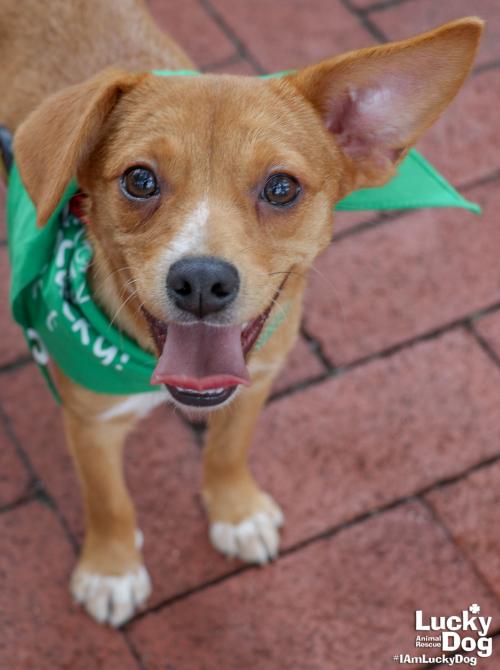While I’m not a behaviorist, and would suggest anyone whose pet seems to have severe or chronic issues seek the guidance of a board certified veterinary behaviorist, I have gleaned some really valuable tips through study and observation over the years. In particular, I’ve noticed the importance of proper socialization and positive reinforcement for puppies so they grow into confident adults.
On occasion, we encounter one of the saddest parts of our jobs as veterinarians: euthanasia of a healthy pet due to behavior issues. Upon further investigation, these pets’ untenable behaviors often stem from anxiety or fear, and we hear the despondent owners’ stories about intense social anxiety, leash aggression, inability to live with a particular person, or aggressive behavior to other dogs. Being a vet in an urban environment, most of the dogs in our care encounter unfamiliar dogs and people on walks at least twice a day, so it’s vital they are properly socialized to process and enjoy this.
The “socialization window” for puppies closes around 14 weeks of age. It’s really important to expose them — with positive results and rewards — to all types of people and noises that will be common in their day to day lives, so that daily routine is not something inherently unfamiliar and potentially scary. Once this time in development has passed, it is more difficult to acclimate puppies to unfamiliar things.

Some common mistakes in socialization include waiting until ALL vaccines are complete (around 16 weeks of age) to expose puppies to things outside the home, reinforcing shyness/retreat behavior, and failure to use proper training devices.
Research local trainers or groups like Your Dogs Friend, who usually offer free or reasonably priced puppy socials or basic manners classes. Puppy classes where all attendees are up to date in ongoing puppy vaccines, positive reinforcement is the only training method, and exposure to healthy adult dogs with good social skills on neutral ground are excellent ways to ensure good basic social skills.
There are lots of take home skills attained by interacting with other dogs and puppies during this socialization window. Puppies learn subtle social cues and manners acceptable to other dogs. They may get a “side-eye” or snarl or even a gentle nip or push-off from a dog whose boundaries they have pushed too far, and that’s sometimes how they learn.

Along with classes and exposure prior to 14 weeks, and continuing until mastery, basic manners will help with efforts and outings to encourage good social skills. For large or boisterous pups, a halter type lead such as a Gentle Leader is a great tool. For shy pups, encouraging (and rewarding with high value treats) confident behavior, not relieving or rewarding “retreat” and hiding, is essential. Most pups outgrow a period of shyness. A trainer or vet can help with this behavior if it persists, as you also don’t want to push a shy pup and worsen fear or shyness.
A great training tool is the Clicker, popularized by Dr Karen Pryor. Her training books are also excellent for owners, and simple to implement. All pups can easily learn basic manners and skills such as sit, down, come, leave it, and settle.
If excessively shy or any aggressive behavior is noted in your pet, please set up a behavioral consult with your veterinarian or a veterinary behaviorist. A growl is not necessarily a dog or pup being naughty; it’s their way of saying they’ve had enough. Respect the growl, lest you push things to the next level (possibly a bite), but talk to your vet or positive reinforcement trainer about any difficulties.
Working with your puppy on many different surfaces such as grates, grass, linoleum, wood, concrete, mulch, stairs, ramps, etc, as well as gentle introduction to noises like Metro buses and trains, traffic, construction, vacuums, etc, are good ways to ensure these won’t be foreign and potentially anxiety inducing later on. Also, realize that some dogs, like some people, will not feel comfortable in a crowded, noisy environment like a festival or dog park. It’s ok to avoid those areas to keep your pet safe and happy.
Socializing puppies is a bit of an art, in that we want to reward good behavior that is pleasing to us, but we don’t want to push them out of their comfort zone, especially if we can acclimate the pup without doing so!
For a list of veterinary behaviorists and helpful pet owner links on behavior, please check out https://www.dacvb.org/page/petownerresources
Local positive reinforcement dog training group with weekly puppy classes in a dedicated space in NW DC: http://www.dogtrained.com
For a list of positive trainers and tips on puppy socialization and dog body language: https://yourdogsfriend.org/we-recommend/positive-trainers and https://yourdogsfriend.org/life-with-dogs/advice-for-puppy-parents
*Article courtesy of Dr. Jann Elliott DVM
